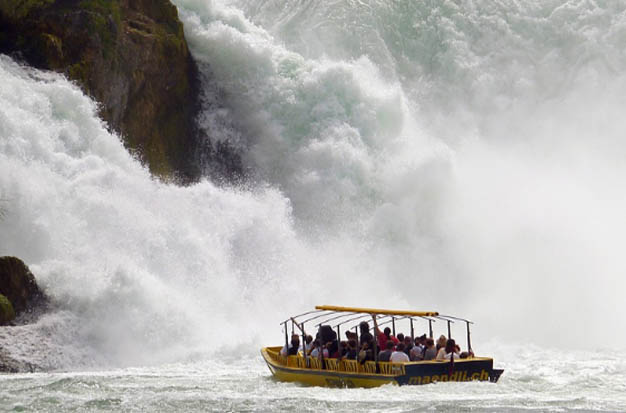Some people mistakenly believe that a pontoon boat can’t sink because of its lightweight, but they’ll be shocked to see their boat sink if caution isn’t exercised. When it comes to water sports, fishing, or socializing, pontoon boats are the best choice.
Although you shouldn’t push them past their breaking point, they are secure for the majority of water activities. They must receive routine maintenance to stay in good working order because they are only intended for use in certain capacities.
Why People Say That Pontoon Boats Can’t Sink
Since it’s so uncommon to see a pontoon boat sink, many people have come to believe that it can’t possibly happen. Pontoon boats are among the safest and most stable boats you can find. In part, this is accurate.
Damage to the hull is one of the most frequent causes of boat sinking. However, because of some ingenious engineering, pontoon boats are somewhat immune to this.
A pontoon boat has one deck and two tubes attached to the sides in place of a hull. These tubes are inflated with air, which makes the boat float. Although the pontoon boat is much more stable as a result of this design, it is not for this reason that some claim they are unsinkable. The tubes hold the answer to that question.
Top Reasons Why A Pontoon Boat Sink
Bad Weather
Bad weather can seriously damage pontoon boats. Despite being extremely stable by design, pontoon boats can only be used in calm waters. If multiple large waves strike a pontoon boat, it can sink very quickly.
Additionally, strong winds have the ability to easily move pontoon boats. The pontoon boat will be pushed by the wind if you are not careful until it collides with something. Your boat may sustain significant damage even though this won’t necessarily sink it.
Utilizing your pontoon boat in inclement weather is the simplest way to solve this issue. And if a storm catches you off guard while you are out on the water in your pontoon boat, try to leave as soon as you can.
Mounting The Wrong Motor
The motor can deliver the force required to propel the boat, and the pontoon is equipped with a motor that is suitable for carrying the weight specified in the manual guide.
The boat will sink if the motor needs to be replaced and you end up installing a motor with less power.
Overloaded
It’s simple to overextend when you extend an invitation because a pontoon boat has a lot of space. Without realizing it, you might end up with too many passengers and too much stuff on the pontoon.
Your pontoon won’t start to sink right away, but this will increase its vulnerability to sinking. The deck will eventually give up and bend or break if you keep doing this.
Follow the manufacturer’s weight capacity recommendations for pontoon boats at all times to prevent overloading. Usually, you can find them on the manufacturer’s website as well as in the book that came with the pontoon, on the pontoon, or inscribed on it. You can always contact the manufacturer by phone or email if you have trouble locating the weight capacity.
Another excellent method to check whether your boat is overloaded is to look at the water line on the pontoon. Never raise the pontoon’s middle above the water line. In fact, it is best if the water is below the surface.
The Pontoons Have Water In Them
A pontoon boat is called so because the tubes it sits on are called “Pontoons”. The hollow tubes that make up the boat’s hull are what keeps it afloat. For some reason, water can get inside them, for example when the drainage exit isn’t tightly closed.
The boat will sink as soon as water enters these tubes, causing it to sit below the surface. Even though a small amount of water inside a tube won’t immediately cause issues, it’s still important to regularly check the tubes to make sure that the water has been drained from them.
Bad Weight Distribution
Even though overloading the boat and poor weight distribution are closely related, the latter can be even worse. Adding too much weight to the front or the back of the pontoon could cause your boat to sink, but overloading the boat won’t necessarily cause problems right away.

When there are more passengers than the boat can accommodate, this most frequently occurs, and everyone congregates at the bow or stern of the vessel. When someone is water skiing or tubing and everyone gathers at the back of the boat to watch them, this is something that can easily happen. Or when someone is out fishing and catches a large fish, and everyone gathers to watch.
As you can see, something like this can occur without your knowledge. As a result, weight distribution must be handled with extreme care.
Once more, you can observe the water’s edge on the pontoon’s side. The pontoons’ water lines should always be lower at the bow than they are at the back. A pontoon usually rests in this position. You should act quickly to correct this if your water lines are in the incorrect order; otherwise, your pontoon may nosedive and eventually sink.
How To Prevent Your Boat From Sinking Dockside
Eight out of every ten sterndrive failures involve damaged bellows, accounting for more than a quarter of all sinkings caused by part failures. The bellows are the pliable rubber boots that keep water away from the drive for the universal joint, exhaust, cooling water, and shift cable between the engine and the drive.
The bellows keep their watertight seal while allowing the driver to turn in all directions and trim up and down, but repeated motions can eventually cause tearing from fatigue. Rubber can deteriorate with time due to wear and tear, especially if exposed to heat or other harsh conditions. Marine growth, which forms in the creases and causes a split, can be particularly problematic. Regular checks for tears or cracks, annual haul-outs to clean and remove the growth, and complete replacements every three to six years are all advised. Giving this some thought can double your chances of surviving.
An ounce of prevention can save gallons and gallons of remedy when it comes to winterizing. Ice can harm through-hull valves, strainer baskets, and underwater hoses. During the boating season, water may contaminate the gear lube; if it freezes, it may crack metal and blow seals. When the spring thaw arrives, such problems could send the boat straight to the bottom. Top items on any winterizing checklist include fresh lubricant in the gear case, antifreeze in the engine’s raw-water systems, strainers, and freshwater systems.
Over the winter, batteries can die, making the bilge pump inoperable. One or two minor leaks, or an unlucky rain or snow that ends up in the bilge, could sink her if no one is regularly checking in. Visit the boat. This is extremely important. Regardless of the season, regular visits from you or the marina staff can frequently stop a boat from sinking. It will need to be dealt with right away, but that is a thousand times better than having to bring it back from the dead.
Not to be alarmist, but the bottom of your boat probably already has a ton of holes in it. These can include openings for mounting bolts, transducers, sensors, through-hull valves, and other components. These would all be properly secured, sealed, and/or clamped to keep water out in an ideal world, along with any downstream hose clamps, fittings, and strainers. In fact, they probably were when the boat was brand-new. However, aging, vibration (and pounding and slapping), thermal cycling, corrosion, and other factors can work to loosen clamps and bolts and even cause structural cracks around fittings, all of which can result in leaks.
The Bottom Line
Numerous factors can cause pontoon boats to capsize. The majority of pontoon boat owners will concur that they have not personally encountered the majority of these situations, and they do appear to be unusual. However, you never want to believe that a boat cannot sink because that could have negative consequences. A pontoon boat may float or sink as a result of overloading, uneven weight distribution, damage, poor handling, or choppy waters.

